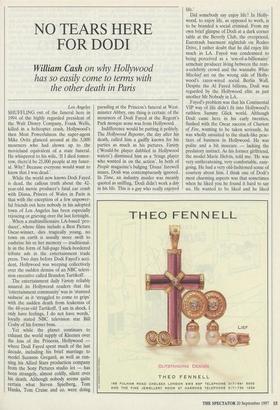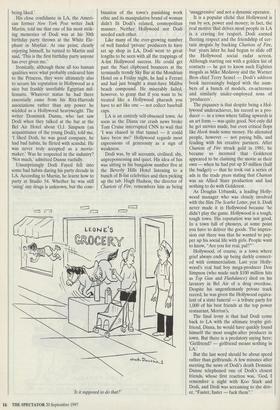NO TEARS HERE FOR DODI
William Cash on why Hollywood has so easily come to terms with the other death in Paris Los Angeles SHUFFLING out of the funeral here in 1994 of the highly regarded president of the Walt Disney Company, Frank Wells, killed in a helicopter crash, Hollywood's then Most Powerfulness the super-agent Mike Ovitz glanced around at the 5,000 mourners who had shown up to the movieland equivalent of a state funeral. He whispered to his wife, 'If I died tomor- row, there'd be 25,000 people at my funer- al. Why? Because everyone would want to know that I was dead.'
While the world now knows Dodi Fayed is dead, the callous truth about the 42- year-old movie producer's fatal car crash with Diana, Princes of Wales in Paris is that with the exception of a few unpower- ful friends out here nobody in his adopted town of Los Angeles has been especially rejoicing or grieving over the last fortnight.
When a multimillionaire LA-based 'pro- ducer', whose films include a Best Picture Oscar-winner, dies tragically young, no town on earth is usually more swift to enshrine his or her memory — traditional- ly in the form of full-page black-bordered tribute ads in the entertainment trade press. Two days before Dodi Fayed's acci- dent, Hollywood was weeping collectively over the sudden demise of an NBC televi- sion executive called Brandon Tartikoff.
The entertainment daily Variety reliably assured its Hollywood readers that the `entertainment community' was in 'stunned sadness' as it 'struggled to come to grips' with the sudden death from leukemia of the 48-year-old Tartikoff. 'I am in shock. I only have feelings, I do not have words,' loyally stated NBC television star Bill Cosby of his former boss.
Yet while the planet continues to exhaust the world supply of Kleenex over the loss of the Princess, Hollywood where Dodi Fayed spent much of the last decade, including his brief marriage to model Suzanne Gregard, as well as run- ning his Allied Stars production company from the Sony Pictures studio lot — has been strangely, almost coldly, silent over his death. Although nobody seems quite certain what Steven Spielberg, Tom Hanks, Tom Cruise and co. were doing parading at the Princess's funeral at West- minster Abbey, one thing is certain: of the mourners of Dodi Fayed at the Regent's Park mosque none was from Hollywood.
Indifference would be putting it politely. The Hollywood Reporter, the day after his death, called him a gadfly known for his parties as much as his pictures. Variety (Would-be player dabbled in Hollywood waters') dismissed him as a 'fringe player who wanted in on the action'. In both of People magazine's bulging 'Diana' farewell issues, Dodi was contemptuously ignored. In Time, an industry insider was meanly quoted as sniffing, Dodi didn't work a day in his life. This is a guy who really enjoyed Did somebody say enjoy life? In Holly- wood, to enjoy life, as opposed to work, is to be branded a social criminal. From my own brief glimpse of Dodi at a dark corner table at the Beverly Club, the overpriced, Eurotrash basement nightclub on Rodeo Drive, I rather doubt that he did enjoy life much in LA. Fayed was condemned to being perceived as a 'son-of-a-billionaire' armchair producer living between the rent- a-celebrity crowd and the wannabe White Mischief set on the wrong side of Holly- wood's razor-wired social Berlin Wall. Despite the Al Fayed billions, Dodi was regarded by the Hollywood elite as just another Mr Nobody in LA.
Fayed's problem was that his Continental VIP way of life didn't fit into Hollywood's ruthless Sammy Glick world. Although Dodi came here in his early twenties, flushed with the Oscar success of Chariots of Fire, wanting to be taken seriously, he was wholly unsuited to the shark-like prac- tices of business in Hollywood. He was polite and a bit insecure — lacking the predatory instinct. As his former girlfriend, the model Marie Helvin, told me: 'He was very unthreatening, very comfortable, easy- going. He had a very old-fashioned sense of courtesy about him. I think one of Dodi's most charming aspects was that sometimes when he liked you he found it hard to say no. He wanted to be liked and he liked being liked.'
His close confidante in LA, the Ameri- can former New York Post writer Jack Martin, told me that one of his most strik- ing memories of Dodi was at his 30th birthday party thrown at the White Ele- phant in Mayfair. At one point, clearly enjoying himself, he turned to Martin and said, 'This is the first birthday party anyone has ever given me.'
Ironically, although these all too human qualities were what probably endeared him to the Princess, they were ultimately also to secure his reputation in Hollywood as a nice but frankly unreliable Egyptian mil- lionaire. Whatever status he had there essentially came from his Ritz-Harrods associations rather than any power he wielded as a Hollywood heavyweight. The writer Dominick Dunne, who last saw Dodi when they talked at the bar at the Bel Air Hotel about O.J. Simpson (an acquaintance of the young Dodi), told me, I liked Dodi, he was good company, he had bad habits, he flirted with scandal. He was never truly accepted as a movie- maker.' Was he respected in the industry? `Not much,' admitted Dunne ruefully.
Unsurprisingly Dodi Fayed fell into some bad habits during his party decade in LA. According to Martin, he learnt how to party at Studio 54. Whether he was still `using' any drugs is unknown, but the com- bination of the town's punishing work ethic and its manipulative brand of woman didn't fit Dodi's relaxed, cosmopolitan manner. Neither Hollywood nor Dodi needed each other.
Like many of the ever-growing number of well funded 'private' producers to have set up shop in LA, Dodi went to great lengths to be seen with all the trappings of A-list Hollywood success. He could get past the Nazi clipboard bouncers at the terminally trendy Sky Bar at the Mondrian Hotel on a Friday night, he had a Ferrari and had just bought a must-have Malibu beach compound. He miserably failed, however, to grasp that if you want to be treated like a Hollywood pharaoh you have to act like one — not collect baseball caps.
LA is an entirely self-obsessed town. As soon as the Diana car crash news broke Tom Cruise interrupted CNN to wail that `I was chased in that tunnel — it could have been me!' Hollywood regards most expressions of generosity as a sign of weakness.
Dodi was, by all accounts, civilised, shy, unprepossessing and quiet. His idea of fun was sitting in his bungalow number five at the Beverly Hills Hotel listening to a bunch of B-list celebrities and then picking up the tab. Hugh Hudson, the director of Chariots of Fire, remembers him as being `Is it supposed to do that?' `unaggressive' and not a dynamic operator.
It is a popular cliché that Hollywood is run by sex, power and money; in fact, the real motive that drives most people in LA is a craving for respect. Dodi earned fleeting respect and the friendship of cer- tain moguls by backing Chariots of Fire, but years later he had begun to slide off the Hollywood social radar screen. Although starting out with a golden list of contacts — he got to know such Eighties moguls as Mike Medavoy and the Warner Bros chief Terry Semel — Dodi's address book increasingly bulged with the num- bers of a bunch of models, ex-actresses and similarly under-employed sons of `producers'.
The piquancy is that despite being a Hol- lywood underachiever, his record as a pro- ducer — in a town where falling upwards is an art form — was quite good. Not only did he get movies made, but even critical flops like Hook made some money. He alienated people, however — not paying bills, and feuding with his creative partners. After Chariots of Fire struck gold in 1981, he became so incensed that Goldcrest appeared to be claiming the movie as their own — when he had put up $3 million (half the budget) — that he took out a series of ads in the trade press stating that Chariots was an Allied Stars production and had nothing to do with Goldcrest.
As Douglas Urbanski, a leading Holly- wood manager who was closely involved with the film The Scarlet Letter, put it, Dodi never made it in Hollywood because 'he didn't play the game. Hollywood is a tough, tough town. His reputation was not good. In a town full of phoneys, at some point you have to deliver the goods. The impres- sion out there was that he wanted to pep- per up his social life with girls. People want to know, "Are you for real, pal?"' Hollywood, of course, is a town where grief always ends up being darkly connect- ed with commercialism. Last year Holly- wood's real bad boy mega-producer Don Simpson (who made such $100 million hits as Top Gun and Flashdance) died on his lavatory in Bel Air of a drug overdose. Despite his ungentlemanly private track record, he was given the Hollywood equiva- lent of a state funeral — a tribute party for 1,000 of his best friends at the top power restaurant, Morton's.
The final irony is that had Dodi come back to LA with the ultimate trophy girl- friend, Diana, he would have quickly found himself the most sought-after producer in town. But there is a predatory saying here: `Girlfriend? — girlfriend means nothing in LA.'
But the last word should be about speed rather than girlfriends. A few minutes after meeting the news of Dodi's death Dominic Dunne telephoned one of Dodi's closest friends, whose first reaction was, `God, I remember a night with Koo Stark and Dodi, and Dodi was screaming to the driv- er, "Faster, faster — fuck them".'



































































 Previous page
Previous page